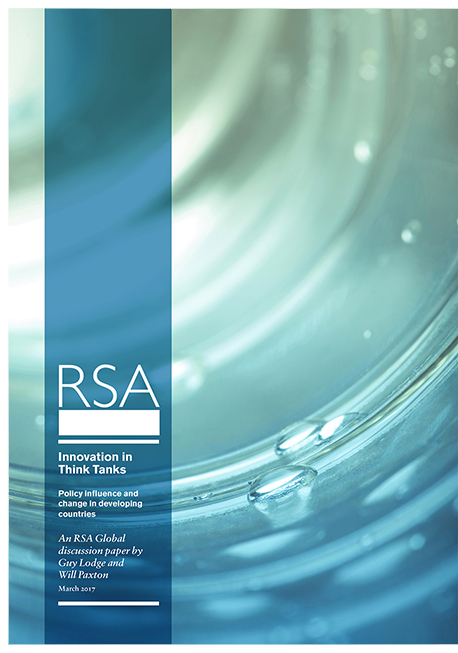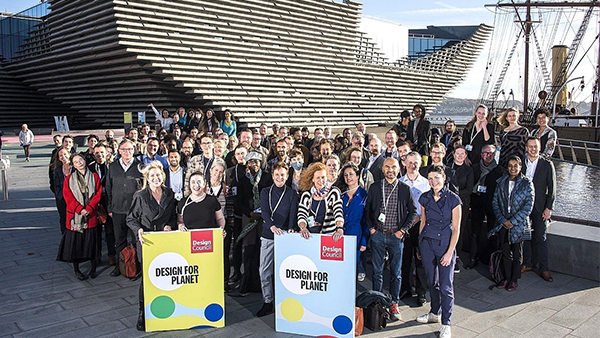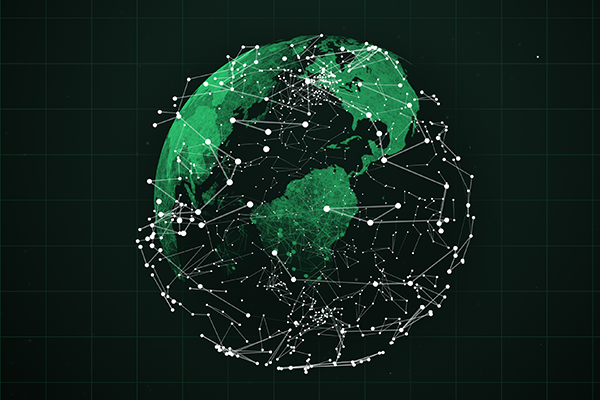What is the role of a think tank or social change organisation today? While this is unlikely to be a burning question for many, it is something we, at the RSA, regularly consider as we increasingly understand what it means to have an impact.
We live in unprecedented times characterised by rapid change in the way we live and work, coupled with (seemingly) insurmountable societal problems. It is within this context that we believe institutions who are committed to social change continuously question and adapt their existing models to respond to and address society’s challenges. The same is true for think tanks, who are not often considered as civil society actors but have the potential to play a vital role in the development of a country’s future.
Today we launch a RSA Global discussion paper entitled, Innovation in Think tanks - Policy influence and change in Developing countries which explores how think tanks support social change and how they must be fit for purpose to enable progress in their local context. The focus of the paper is on the experience of think tanks in the global south, how they operate and why donors need to pay more attention to them. Think tanks are unique in that they exist at the intersection of evidence based research and policy making, and their multi-disciplinary audiences (governments, policy specialists and the wider society as whole) allow them to be potentially powerful force for ideas. 
At the RSA we believe the current lack of trust in government and institutions is, in part, due to a failure of policy solutions that really tackle society’s intractable problems. For the public, experts and their datasets do not describe reality, and any attempts to solve problems are often too narrowly defined, attending only to a few policy levers in lieu of reviewing the system as a whole. Or, these solutions suffer from a strict path dependency, following predictable steps towards predetermined outcomes which, in reality, this is rarely the case.
For innovative solutions to truly address the lives of all people and leave no one behind social actors, such as think tanks, must move beyond its traditional core model and innovate. This paper argues that they should act politically and exercise power and influence when necessary. The paper suggests three directions for innovation that we open for discussion:
- Political insights: think tanks should explicitly develop the expertise and knowledge of the local political context, for example through carrying out ‘political and power’ assessments on any given issue.
- Elite convening: think tanks could develop function that not only facilitates debate and discussion between key interest groups, but which looks to identify collective interests and coordinate actions across different stakeholders to help bring about policy change.
- Campaigns and alliances: think tanks may mean engage in more bottom-up approaches to policy influence, leveraging the power of citizens and communities to press the case for reform.
The RSA is committed to maximising its global impact and welcome comments and thoughts on how think tanks can play an increasingly effective role in social change.
Related articles
-
A design revolution for the climate emergency
Joanna Choukeir
Joanna Choukeir on Design for Planet, the global gathering of designers during COP26, and the changes design must make.
-
US elections: the whole world is watching
Adanna Shallowe
The Caribbean’s experience shows how American policy affects us all.
-
The broader purpose of the environmental movement
Hila Chenzbraun Philipa Duthie
How can environmental movements tackle the climate crisis and social and racial injustice?




Join the discussion
Comments
Please login to post a comment or reply
Don't have an account? Click here to register.
I was fascinated to read this report, especially from a context where the influence of think tanks in the UK has grown considerably in recent years. Viewing this from an international perspective can be seen as both a positive move towards beneficial change and policy making, and also beset with potential bear traps.
As seen here in the UK think tanks rely on donors, many of which have their own political agendas, areas of influence and target audiences.
Donors from the corporate world will often fund work that supports these agendas. Segregating donor interests is a key area of difficulty which can ultimately affect the credibility of a think tank.
The potential for the emergence rival think thanks based on political and economic interests is a real prospect, in the same way that we have seen the emergence of 'news' agencies sponsored by competing political and ideological entities. As often stated, when unsure of the validity or credibility of an organisation, follow the funding trail.
Being able to internationally accredit think tanks may offer a valuable mechanism to establishing those that have impartiality, the right skills and connections, and more importantly, the right technical competence to operate in their regions.
Understanding the effect of change is crucial, the report highlights this and it is a key factor for knowing how complex systems can be interrupted in the wrong way if impacts and interdependencies are not fully appreciated or understood.
I am not sure the case for pursuit of think tanks over academic channels was fully made, and perhaps the interactions between them as influencers and actors would be useful to fully appreciate this.
Core to the success for the development of new think tanks is the ability to be innovative and deliver real world solutions that avoid the natural tendency of thinking to follow and mimic solutions in other regions.
Ultimately though genuine positive influence has to overcome the entrenched views that the long term accrual of benefits rather than the generation of instant results is often not politically acceptable to a governing regime.
A very thought provoking report that has widespread benefits not only for the developing international sector, but also for the operation of think tanks in western world economies.